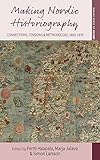Making Nordic Historiography : Connections, Tensions and Methodology, 1850-1970 / ed. by Pertti Haapala, Simon Larsson, Marja Jalava.
Material type: TextSeries: Making Sense of History ; 32Publisher: New York ; Oxford : Berghahn Books, [2017]Copyright date: ©2017Description: 1 online resource (332 p.)Content type:
TextSeries: Making Sense of History ; 32Publisher: New York ; Oxford : Berghahn Books, [2017]Copyright date: ©2017Description: 1 online resource (332 p.)Content type: - 9781785336263
- 9781785336270
- 948.0072 23
- DL44.8 .M35 2017
- DL44.8 .M35 2017
- online - DeGruyter
| Item type | Current library | Call number | URL | Status | Notes | Barcode | |
|---|---|---|---|---|---|---|---|
 eBook
eBook
|
Biblioteca "Angelicum" Pont. Univ. S.Tommaso d'Aquino Nuvola online | online - DeGruyter (Browse shelf(Opens below)) | Online access | Not for loan (Accesso limitato) | Accesso per gli utenti autorizzati / Access for authorized users | (dgr)9781785336270 |
Frontmatter -- Contents -- Acknowledgements -- Introduction. Nordic historiography: from methodological nationalism to empirical transnationalism -- Chapter 1. Writing our history: the history of the ‘Finnish people’ (as written) by Zacharias Topelius and Väinö Linna -- Chapter 2. The impact of Grundtvig’s ideology on Icelandic historiography -- Chapter 3. Cultural aspects of the pan-Scandinavian movement: the perspective of historians -- Chapter 4. National, international or transnational? Works and networks of the early Nordic historians of society -- Chapter 5. Scientific historiography and its discontents: Danish and Swedish ‘aristocratic empiricism’ -- Chapter 6. Nationalist internationalism: Danish and Norwegian historical research in the aftermath of the First World War -- Chapter 7. Nordic networks at work: power struggles in the Scandinavian historical field, 1935–1942 -- Chapter 8. The rhythm and implicit canon of Nordic history by Eli F. Heckscher and Eino Jutikkala -- Chapter 9. Negotiating Norden: Nordic historians revising history textbooks, 1920–1970 -- Chapter 10. Loneliness: being a woman in the Nordic community of historians -- Chapter 11. Trans-Nordic neo-empiricism in a European setting – or, why did Foucault leave Uppsala? -- Index
restricted access online access with authorization star
http://purl.org/coar/access_right/c_16ec
Is there a “Nordic history”? If so, what are its origins, its scope, and its defining features? In this informative volume, scholars from all five Nordic nations tackle a notoriously problematic historical concept. Whether recounting Foucault’s departure from Sweden or tracing the rise of movements such as “aristocratic empiricism,” each contribution takes a deliberately transnational approach that is grounded in careful research, yielding rich, nuanced perspectives on shifting and contested historical terrain.
Mode of access: Internet via World Wide Web.
In English.
Description based on online resource; title from PDF title page (publisher's Web site, viewed 25. Jun 2024)


